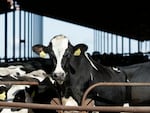
A farmworker exposed to infected cattle has gotten sick with avian flu in Michigan, the third human case in the current U.S. outbreak among dairy cows.
Rich Pedroncelli/AP / AP
Michigan’s health department announced Thursday a human case of bird flu in a dairy worker. It’s the third human case reported to date in the current U.S. avian flu outbreak among dairy cows.
Unlike the previous two cases which only involved eye infection, this patient has respiratory symptoms, according to a statement from Dr. Natasha Bagdasarian, chief medical executive with the Michigan health department. The patient had direct exposure to an infected cow and wasn’t wearing any personal protective equipment.
“This tells us that direct exposure to infected livestock poses a risk to humans,” said Bagdasarian.
The Centers for Disease Control and Prevention said in a statement that its labs tested a sample from the Michigan patient and confirmed it was H5N1 bird flu. The patient had flu-like symptoms, including a cough, fever and eye discomfort. The patient was treated with antivirals and is isolating at home. No other workers or household contacts of the patient have gotten sick so far.
The CDC said that risk to the general public remains low. Like the other two recent cases, this infection came from direct exposure to an infected animal. “There is no indication of person-to-person spread of A(H5N1) viruses at this time,” according to the CDC.
The CDC is monitoring data from influenza surveillance systems, and said "there has been no sign of unusual influenza activity in people."
Both the CDC and Michigan health officials emphasized the importance of protecting farm workers from possible exposure.
Michigan Department of Agriculture and Rural Development director Tim Boring said his department is offering support to dairy farms in need of protective gear. "Proper use of personal protective equipment is the best tool we have to protect farm workers."
Copyright 2024 NPR
